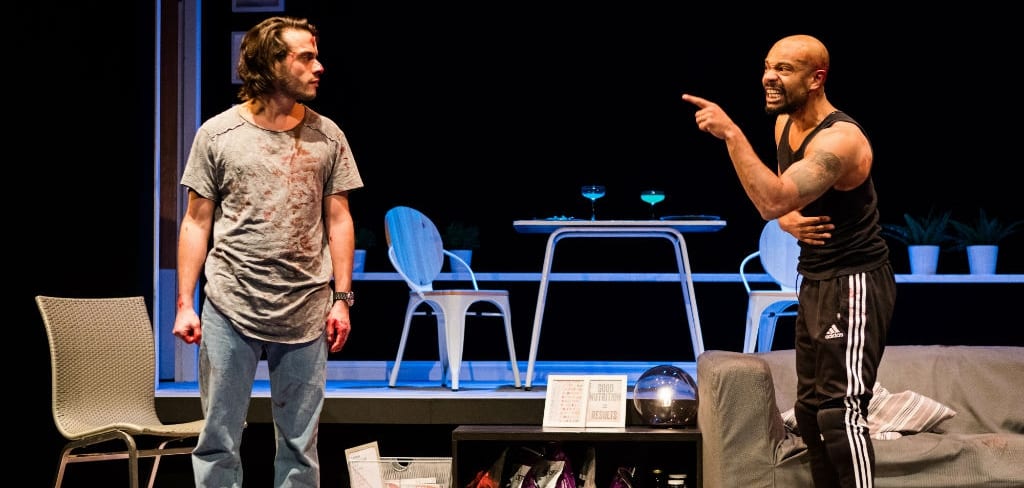It’s not all good or bad. The last few months have proven to be an anxious time for regional theatres across the UK, with increasingly tight budgets, and some controversial funding choices. Yet, at the same time, venues such as Cardiff’s Sherman have been distinguishing themselves with very high calibre productions such as their award-winning staging of The Cherry Orchard, in a Welsh reimagining by Gary Owen and Rachel O’Riordan. With The Motherf**ker with the Hat, co-produced with Glasgow’s Tron Theatre, we look beyond Wales to America, in a successful, incredibly energetic creation about five men and women’s struggles with their self-sabotaging tendencies.
This success owes much to the quality of the writing. Stephen Adly Girgis’s dialogues are run through with acerbic wit and never short of an inventive expletive or expressive imagery (‘you’re so far off the line, you’re in Zimbabwe’). Swearwords – including the titular mother**ker – though definitely present, never feel overused. One line – a woman taunting her absent mother on the phone for drinking too much before snorting cocaine off her own living room table on stage – speaks volumes, without ever falling into excessive pathos. The tone is one of constantly reckless dark comedy.
So, not all good or bad. Jackie (François Pandolfo) is fresh out of prison, and set on leaving his many troubles behind. He loves Veronica (Alexandria Riley), and Veronica loves him. But it only takes one suspicious hat for their peace to shatter, and for Jackie’s old habits – alcohol, and some definite anger management issues – to take over. He runs to his AA sponsor, Ralph D (Jermaine Dominique) for comfort, and seeks help from his Cousin Julio (Kyle Lima), but as Jackie’s stability begins to unravel, the men supposed to bring him relief soon turn out to be rather less well put together than they first appear. As a yoga-and-smoothie-and-all-things-healthy enthusiast, Julio D is a deeply ambiguous figure, hiding his manipulativeness and fragility under the guise of a well-meaning guru. While Alexandria Riley and Renee Williams (who portrays Ralph D’s frustrated wife Victoria) delivered excellent performances, I found myself more drawn to the trio of men formed by Pandolfo, Dominique and Lima. The latter plays a young man who compensates for his ambiguous masculinity with a gym addiction, but also proves to be the play’s most normal character, and an endless source of comic relief. Pandolfo’s Jackie seems permanently about to explode. Finally, Dominique’s Ralph D is nuanced, multifaceted (some would say double-faced) and subtly unnerving.
The play explores the tension between ‘wellness’ and authenticity. Ralph and Julio might have reached peak happiness according to the standard of the #fitnation but, as Veronica angrily says to Ralph, that doesn’t prevent them from being navel-gazing, self-satisfied hypocrites.
Kenny Miller’s set – a three-level stage leading from Jackie and Veronica’s messy flat to Julio’s house – paradoxically drives this point home, as chaos circulates in and out of each space, despite efforts to control it. When things reach a bittersweet conclusion, after a – predictable – eruption of violence, no gleaming surface is left unscathed.

